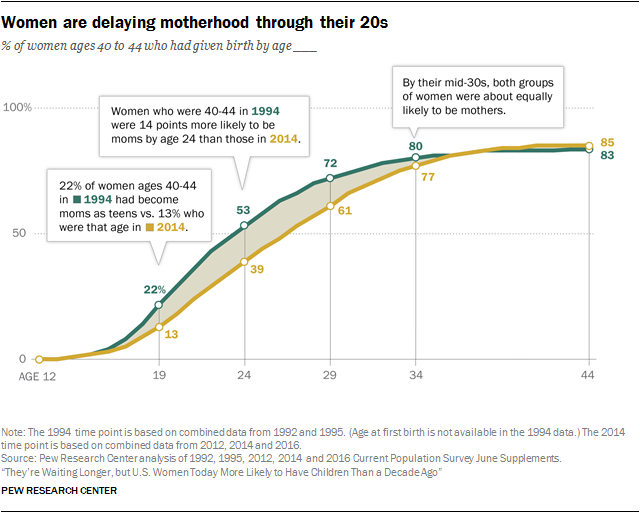@Will_V,
Those are all interesting thoughts.
There's probably a self-worth factor in there. I think the biggest trigger for it is economics.
If you read enough history, you see this problem repeatedly in advanced societies. The people stop reproducing, and the leaders do all sorts of things to try to ramp up reproduction again, usually to no avail. Even offering huge tax incentives rarely works.
Mainstream society in general is heavily socialized against families. All kinds of alternative lifestyles and alternative sexualities are lauded. TV and magazines talk about how great it is to be free and not deal with the burden of children. Climate change people talk about children being morally bad, because they are bad for the environment; anti-natalists talk about children being bad because in their opinion being a life is net suffering, so creating life is net morally bad... not as many people are directly aware of anti-natalism, but it is a common sentiment you hear from people who don't want children: "I don't know how I'd feel about bringing a child into the world."
I've had some conversations with friends about this, and the conclusion we've come to is that people will reproduce heavily even in poor economic situations that are
stable (thus the explosive fecundity of Africa, or in our own societies of yesteryear), and they will reproduce heavily in economic situations that are improving. However, as the economy shrinks, people curtail their reproduction.
Here's a fascinating graph:
(
from here)
Even among the people who do reproduce, they're having far fewer children.
Looking at that graph, it doesn't actually seem like the number of childless women is growing. According to
this 2018 Pew study, women have actually started reproducing more, albeit at a more advanced age.
Of course, that's just compared to recent decades. Here's what it looks like going back a bit farther:
(so childlessness has doubled since the 1970s. I can't find clear statistics on what it was like earlier than that)
Anyway, there's a whole Wikipedia article on the theories behind demographic transition here:

en.wikipedia.org
But personally, it seems to me the factors are:
- In extreme poverty, mothers produce many children because children are a crapshoot. Most will probably remain in extreme poverty. But perhaps one will strike it lucky, find his way to wealth and success, and share that with the family, or at least increase the family's odds of passing on its genes in a more stable position
- In agriculture societies, mothers produce many children because children are useful. A 2-year-old can gather eggs from the chicken coop, for instance. I had a girlfriend who grew up a poor farmer in an agricultural society (but later went on to be a banker with a master's degree) and as a small child her family used to have her move the family bull from pasture to pasture. Pretty dangerous, and the bull charged her and knocked her over once, but farmers need children to help with all the tasks on the family farm.
- In an early industrial society, children can still work, e.g., in textile factories, sweatshops, etc. So families still produce more of them
- Yet in more advanced societies, child labor becomes outlawed, and there is less and less children can actually do to help the family, and instead children shift over to having to study for longer and longer periods of time before they are able to start offsetting the cost of their care, rearing, and schooling. So people shift over to having fewer and fewer children, and investing more heavily in the rearing and education of the few they do have
Then when you have situations where there is economic decline, or chaos, or uncertainty, you have people self-selecting out of the gene pool by voluntarily not reproducing. Of the folks I know who've gone this route, they've pretty much all had things like:
- Depression and anhedonia in one friend's case
- Bipolar disorder in the case of someone else I knew
- One friend who got a vasectomy claimed he "wasn't good-looking enough to pass on my genes", but later after it became clear his sister also wasn't going to reproduce, and his parents would have no grandchildren, and he'd started living outside the West, he began saying he thought he'd been influenced by Western anti-family propaganda and started toying with the idea of reversing his vasectomy (hasn't made his mind up on that, but it's something he's been weighing)
If you skim the "childfree" Reddit board, it's clear these people are really, really angry. Half the board at any given time is just rants:
**Discussion topics and links of interest to childfree individuals. ["Childfree" refers to those who do not have and do not ever want children...

old.reddit.com
They use demeaning terminology to talk about people who have children ("breeders" -- imagine if "breeders" had derogatory terms for them... I don't even know what that would be and don't want to bother speculating on something, but imagine how pissed off they'd be).
Then after all the angry ranting and labeling they talk about how happy they are to not have to deal with a little snot-nosed kid.
So there does seem to me to be some vein of cynicism / self-loathing among some of the permanently childless. But some of them I also think are genuinely just people who are totally full-on into hedonism, and others are simply ordinary people who have no real reproductive drive.
There's an interesting thought piece here on how human courtship previously
may not have needed to select for a strong reproductive drive -- basically that historically, even if you didn't want to have babies, especially if you were a woman, you were probably going to have them anyway:
In the middle of the last century, Pulitzer Prize winning American author Phyllis McGinley (1956) wrote: “Women are the fulfilled sex....

www.musingsone.com
The end result being that women without a reproductive drive ended up passing on the genes predisposing them to not need to / want to reproduce, because they simply didn't really have the option not to.
If you look at that childfree Reddit board, it is mostly women, venting and angry over not being accepted as non-reproductive females, offended that they aren't being valued for their unique personalities and contributions to Fortune 500 companies' HR departments.
All that said, again, this is a normal historical process you see, where in advanced nations, once the economy has stopped rocketing upward and begun to stagnate, then backslide, the reproduction rate stalls, then falls. Many people fail to produce issue, and those who do have only 1 or 2 children. It seems to me you either need economic progress, or you need a civilization in which children are either lottery tickets or they are very quickly able to start paying their way (i.e., by helping at the family farm, or in a sweatshop) for high birth rates and low childlessness rates.
Two other items I've discussed with friends:
- There is a lack of space in cities, which makes having and rearing children much more difficult. Imagine a couple just scraping by with their corporate jobs, living in a tiny studio in the big city, spending all their money on rent, hoping to move up in their careers, but of course a company is a pyramid shape, and for every worker who moves up, many more will be stuck down below. At what point will this couple feel like they can have children? Ever?
- There is a lack of family support in cities. Following the Grandmother Hypothesis, the reason human females evolved menopause was so that older women could shift their focus over from rearing their own children to helping their children raise their grandchildren. Everyone in cities (for the most part) is isolated, atomized, and alone. There is none of this family support there. Grandparents are far away, and often busy with their own lives, many still working to pay the rent, or otherwise engaged. Contrast that to the countryside, or even suburbs, where grandparents can be much more actively involved, as can other members of the family, and the pace of life is slower
All this seems to feed into it.
If I had to sum up/simplify:
- In advanced societies, children aren't able to immediately contribute (like the 2-year-old collecting eggs on the family farm) and the odds of them striking it big (i.e., "lottery ticket children") are a lot lower than the odds they can claw their way up to a halfway decent midrange station in life with enough parental investment. So people who have children shift over to having few children whom they invest a lot into
- In feminist societies, women are liberated from social pressures and social norms, which leads to women without a strong reproductive drive being able to choose not to reproduce a whole lot more. Some of these women may eventually end up with a guy who cajoles them into producing 1 or 2 children, but many can totally resist this; others may even self-sterilize. All this leads to a depression of the birthrate and an increase in childless women and couples
- With economic constriction, reduced space for families, and atomization / the collapse of familial support networks, people are much more on their own, with far less support for raising children, and may simply decide it is just too hard to even do in the first place. This is theoretically more likely in people with a lot of baggage, personality disorders, or other issues, who are a.) too busy dealing with their own stuff, and b.) possibly making an internal calculus like that proposed for suicides (i.e., "it's better off for my kin if I do not reproduce, thereby freeing up resources for my better adapted kin to reproduce instead")
- Some men, like some women, have zero reproductive drive, and obviously it is also easier than ever for them to eschew marriage and/or children in societies that are atomized, where there is no family around to pressure them into marriage and society largely won't notice or care if they fail to reproduce
- There's also of course all the media propaganda... glorification of how refreshing and burden-free it is to be childless; glorification of various non-reproductive relationships (gay, transsexual, FWB for busy career people who "have no time for relationships", etc.); portraying of reproduction as morally irresponsible ("carbon footprint"; "can't bring a child into a world like this"; etc.). But I actually think this is the smallest element, if perhaps also the most visible, simply because it is everywhere. Obviously, media propaganda is very powerful, but in my estimation the biggest effect it has is in giving those who are already leaning this direction an excuse (i.e., just parrot what you heard on the tube). I don't think it is changing many made-up minds, and I'm skeptical how many on-the-fence people it can convince long-term. You can definitely push someone this direction or that short-term with propaganda. Can you get that person to stick to it for 20 or 30 years, and make permanent decisions (like self-sterilization) he wouldn't otherwise have made without it? In some people, sure, but in the vast majority... I'm skeptical.
But those are my thoughts!
Chase









